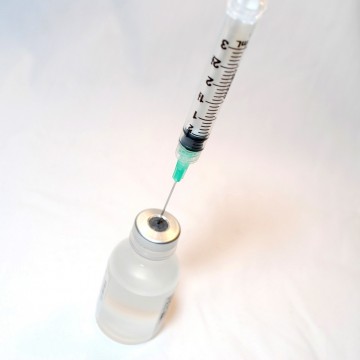Reframing the Measles Vaccine Debate
Thursday, February 12, 2015

There is a lot of shaming going on right now — labeling parents “monsters” who do not vaccinate their children, or calling them, as Jon Stewart put it, people practicing “mindful stupidity.” It’s time to look at this debate in a different light: instead of looking solely at the facts with the aim of proving one side or the other wrong, what needs to be examined is the source of people’s decisions. If the two sides can realize the common ground they have in regards to keeping their children safe, progress can be made.
The anti-vaccine movement was born out of fear. The pro-vaccine movement is trying to use fear to convince people to vaccinate. At the root of both of those fears, however, is the primal urge to keep your children safe by making the best decisions you can about their health. All vaccine debate must come from a place of understanding this fact.
The Numbers
Whichever side you are on, the need to vaccinate or the need not to, you are driven by worst-case scenarios and scary possibilities that don’t play out very often. Is the risk of serious outcome worse if you get measles or worse if you get the vaccine? Most of you would say that clearly the risks are higher with measles, but when you look at the morbidity of the disease the risks aren’t incredibly high. From 1958-1962 (pre-vaccine) the United States reported an average of 503,282 cases of measles each year, and each year about 432 of those cases resulted in death. That means 8/100 of one percent of the people who contracted measles died. The last serious epidemic in the US was from 1989-1991, and during that time 55,000 cases were reported, with 120 resulting in death.
Death is not the only risk, however, and about one child out of every 1,000 who gets measles will develop encephalitis (swelling of the brain) that can lead to convulsions and can leave the child deaf or with permanent brain damage. The risks of the vaccine are similar: seizure, coma, deafness, permanent brain damage, and death.
It is difficult to find exact numbers in regards to just how many children have suffered ill effects from the vaccine, mostly because that information is self-reported, but conservative estimates from the government’s VAERS database puts it at 69 vaccine-related deaths over the last decade.
The Problem with the Numbers
Statistics can be problematic. No matter which side you are on, you choose the numbers that are most favorable to your case and lead with those. For instance, there is a statistic floating around online that in the last 10 years no one in the United States has died from measles, but 108 people have died from the vaccine. Most people would point out that the reason no one has died is because measles was thought to have been eradicated … because of the success of the vaccination program. The number of 108 comes from a non-profit that was founded so that parents of children adversely affected by vaccines can share information and petition for changes in law. The pro-vaccine side has touted a claim that half of all the people who get measles die from it. This, too is problematic, because most of the people who are dying from measles are children who are already severely undernourished and live in communities that have little to no access to medical care. Not exactly applicable to making a decision about your child when you live in the US.
There is another number out there: more than 62% of the people in California who have been diagnosed with measles are adults. The anti-vaccine side has jumped on this as proof that people who are vaccinated are actually much more likely to get the disease. It is likely that many of the adults who are sick are old enough that they were never vaccinated or were improperly vaccinated when the vaccine first came out. You may think that it seems crazy to believe that people are getting sick because they are vaccinated, but how many times have you heard a person say that they have never been sicker than the one time they got the flu shot? To dismiss people’s fears as ridiculous is not going to change any opinions, rather it will entrench them further.
Follow the Money
You always have to look at the funding and motivation behind statistics. If you look at the funding behind influenza vaccines (this information is much more readily available than it is for MMR funding), you will find that the pro-vaccine data comes mainly from research funded by the government and by pharmaceutical companies. You can see why these numbers may be distrusted. A recent paper published by the highly respected BMJ found that of all the 259 studies analyzed, 70% were of poor quality with “overoptimistic conclusions -- that is, not supported by the data presented.” Studies funded in part or fully by the pharmaceutical industry were not just more likely to have conclusions in favor of vaccines, but were also much more likely to be published in high impact journals and disseminated by the media. In fact, researchers found that the majority of doctors, public health advocates and policy makers were all using the same few studies to drive their recommendations, and those studies were overwhelmingly funded by pharmaceutical companies. So while the pro-vaccine side tries to sway the anti-vaccine crowd with numbers, the anti-vaccine crowd is focusing on the fact that the numbers can’t be trusted.

The Right Framework
There was a great interview on OPB during which Shankar Vedantam pointed out that the best way to speak to people’s fears is not by ridiculing them. He said that when his child has a nightmare, he does not tell her how stupid she is for believing that there is monster under her bed. He listens to her fears and then speaks to them, acknowledges them. This is the framework in which the vaccine debate needs to be had.
Pro-vaccinators are livid that parents are choosing not to vaccinate their children, and it is completely understandable. Parents who vaccinate do so because they are afraid of the risks of the measles. They see this partly as a public health debate: your decision not to vaccinate your child could lead to their own child getting sick. They see the anti-vaccine parents as thinking only of the health and safety of their own child while ignoring the impact on the community as a whole.
The anti-vaccine side is afraid for a different reason: based in part on some faulty research that has made big headlines, in part on healthy skepticism of other research presented and paid for by the vaccine-makers and profiters, and also based on the minimal risk of the vaccine in comparison to the minimal risk of the disease.
Many of the decisions parents make about their child’s welfare are based on emotion and fear, and that fear will affect the way you accept or deny factual information. If your child is very highly unlikely to ever encounter measles (remember it was eradicated in 2000), then the risk of them getting very sick or dying from measles is pretty much zero. If you choose to put a shot into your young child’s body that contains all kinds of crazy sounding ingredients (find the list here) and they might possibly, maybe, have lifelong brain damage, deafness or die as a result? Then it is your fault — you gave them something they likely didn’t directly need, and it cost them dearly. This is not logical, but it is how people make decisions.
Before the measles outbreak shows up on your doorstep, it is easy to forego the risks of the vaccine in favor of the likelihood that your child will never get the disease anyway. You are piggybacking on the fact that most other people vaccinated their children. Right now many parents are facing the ramifications of those fears. You don’t lock your doors until your neighbors house is broken into, and you don’t fear the measles until they come to your town.
The point of this article is not to choose a side. It is to illustrate that both sides are fighting completely different and unrelated battles. Neither side is talking to the fears of the other. The people who choose not to vaccinate their children are, in their minds, rightly concerned about the safety and risks that come with vaccines. The people who choose to vaccinate are, in their minds, rightly concerned about the risks to their own children if your child is not vaccinated. Start trying to understand each other. You are all trying to keep your children safe, and if you start your conversations by acknowledging that fact you just might change some minds.

Related Articles
- 9 Ways to Prevent Spring Allergies
- The 2015 Flu Epidemic: Best Bets for Steering Clear of the Flu
- Rethinking Your Relationship With Dairy
- Ten Reasons You Should Go Crazy for Coconut Oil
- Understanding Postpartum Depression




 Delivered Free Every
Delivered Free Every
Follow us on Pinterest Google + Facebook Twitter See It Read It